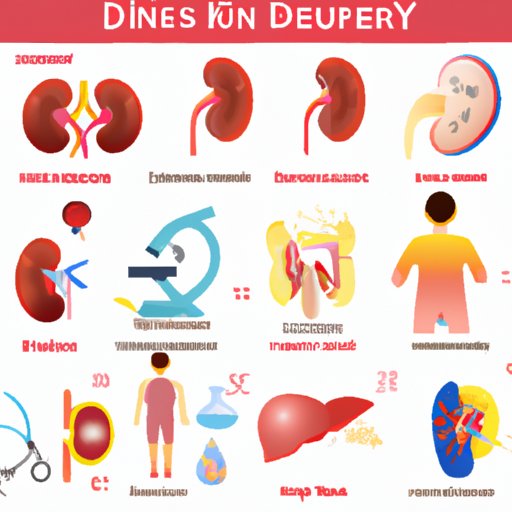
Introduction
Kidney disease is a growing health issue that millions of people worldwide face. It not only affects the kidney’s ability to function properly but can lead to other serious health problems. In this article, we will delve into the causes of kidney disease, symptoms, and prevention strategies.
The Surprising Culprits Behind Kidney Disease: Uncovering Lesser-Known Causes
Besides the well-known causes like high blood pressure and diabetes, other lesser-known factors contribute to kidney damage. Certain medications like nonsteroidal anti-inflammatory drugs (NSAIDs), antibiotics, and chemotherapy drugs can be toxic to the kidneys. Infections such as urinary tract infections and swine flu can cause inflammation in the kidneys, leading to damage over time. Some inherited conditions like polycystic kidney disease can also affect kidney function.
The Link Between Lifestyle Choices and Kidney Damage: An Overview
The choices we make in our daily lives, from diet to exercise and smoking habits, can increase the risk of kidney disease. An unhealthy diet high in salt, sugar, and saturated fats puts stress on the kidneys, leading to damage over time. Smoking causes high blood pressure, which weakens the kidneys over time. A sedentary lifestyle means the kidneys receive less blood flow and oxygen, which can lead to reduced function.
Could Your Job Be Harming Your Kidneys? Understanding the Occupational Hazards
Work environments and professions with exposure to toxins and chemicals pose a risk to kidney health. Workers in agriculture, mining, and chemical manufacturing, for example, are at higher risk due to exposure to toxins that are toxic to the kidneys. High heat exposure, like working in a bakery or a factory, can cause dehydration, leading to kidney damage.
How Genetics Play a Role in the Development of Kidney Disease
Genetics plays a vital role in the development of kidney disease. Inherited conditions like Alport syndrome and autosomal dominant polycystic kidney disease increase the risk of kidney damage. The genetic makeup of an individual can also predispose them to high blood pressure and diabetes, which are primary causes of kidney disease.
The Silent Killer: Exploring the Link Between High Blood Pressure and Kidney Disease
Hypertension, or high blood pressure, is a significant contributing factor to kidney disease. Long-term high blood pressure weakens the blood vessels in the kidneys, leading to reduced function or failure over time. Managing blood pressure through medication, exercise, and a healthy lifestyle can prevent kidney damage.
Are You At Risk? Identifying the Warning Signs and Symptoms of Kidney Disease
Kidney disease symptoms can be silent in the early stages, making diagnosis challenging. Symptoms like fatigue, muscle cramps, and swelling in the legs and feet can be warning signs. Other warning signs include high blood pressure, decreased urine output, and blood in urine. Early detection is crucial in preventing kidney disease progression.
Prevention is Key: Top Tips for Protecting Your Kidneys and Reducing Your Risk of Disease
Protecting your kidneys and reducing the risk of kidney disease is achievable with practical advice. A healthy diet low in salt, sugar, and saturated fats; proper hydration; regular exercise; and refraining from smoking all contribute to kidney health. Regular check-ups with your doctor can also help identify any issues early on.
Conclusion
Kidney disease is a significant health issue worldwide, but awareness and prevention are within reach. Understanding the causes, symptoms, and preventative strategies can help to protect your kidney health. Small lifestyle changes can make a big difference in promoting healthy kidney function, and early detection can prevent kidney disease progression.





